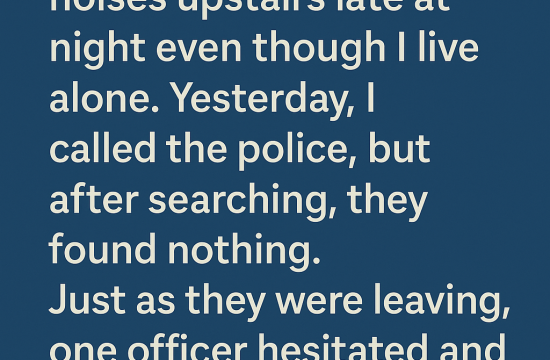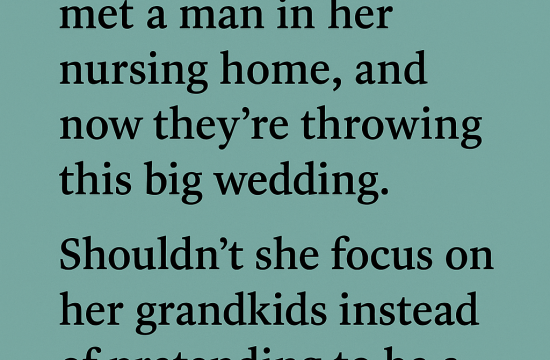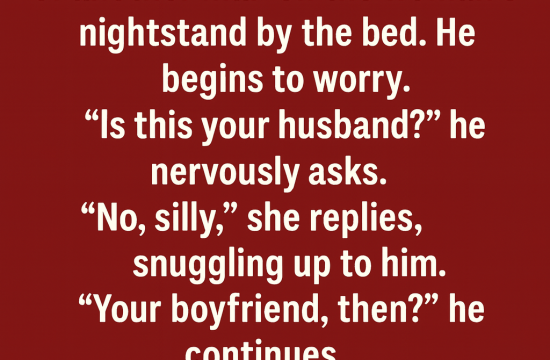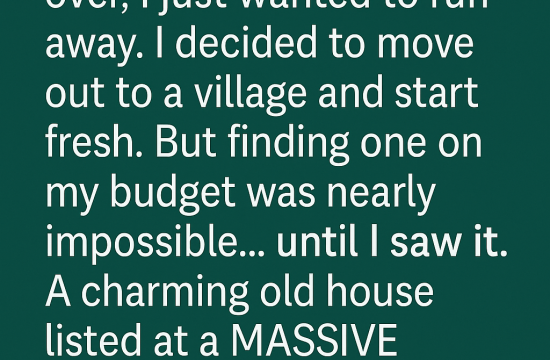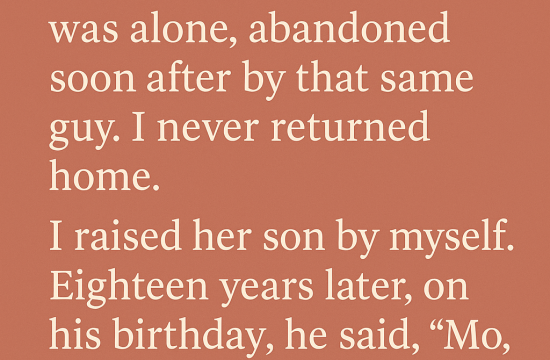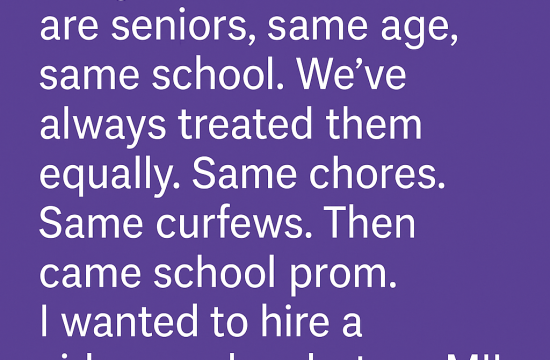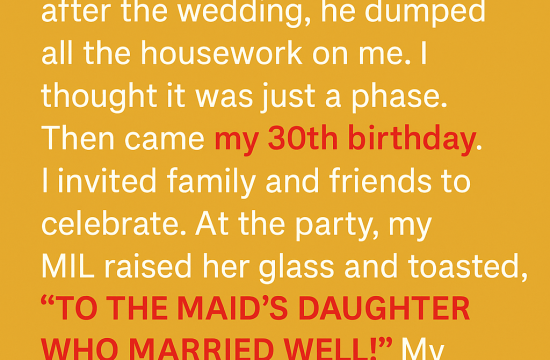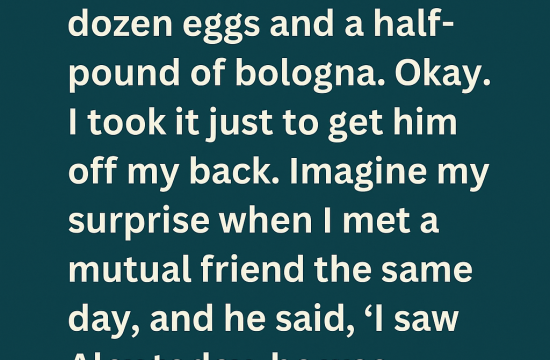A new client came into our salon asking for a fresh cut and color. Hours later, when she saw the result, her eyes welled up and she began to cry.
“This is horrid! I won’t pay a dime!”
The manager, Tomas, came out to see what the fuss was about. The moment he laid eyes on her, he turned ghostly pale. He pulled us aside and hissed, “You idiots!”
The salon went dead silent. You could hear the low hum of hair dryers and the awkward shuffle of a client flipping through a magazine. The woman stood at the mirror, her eyes glassy, her lower lip trembling. Her new soft copper layers actually looked stunning. But something clearly wasn’t right.
I stepped back, scissors still in hand. “I followed exactly what she asked for,” I whispered to my coworker Mara.
She nodded, equally puzzled.
Tomas took a deep breath and approached the woman. “Ma’am, I… I think there’s been a misunderstanding. Would you step into my office for a moment?”
She shot all of us a sharp look but followed him into the back. The door closed behind them.
“Do you know her?” Mara asked Tomas in a whisper when they re-emerged ten minutes later.
He didn’t respond. Just walked over, refunded her in full, offered to pay for her Uber, and handed her a voucher for a free future service.
She didn’t say thank you. She just walked out.
We all stood frozen, clutching towels and combs, waiting for Tomas to explain. Instead, he muttered, “Back to work,” and vanished into the back room.
The rest of the day dragged. Conversations were flat. Even the cheerful pop music on the speakers felt out of place.
The next morning, I came in early, hoping to talk to Tomas. He was already there, sipping coffee and staring blankly at the appointment book.
“Tomas,” I said gently. “Who was she?”
He didn’t answer right away. Then, quietly, he said, “My sister.”
I blinked. “Wait—what?”
He exhaled slowly. “I haven’t seen her in nearly twelve years. Her name’s Ellie.”
I didn’t know how to respond. She hadn’t seemed broken. Just… distant. Controlled.
“She changed her name after our dad died,” he continued. “We had a massive fallout. She blamed me for what happened with the inheritance, and I blamed her for walking away. She cut all contact. Yesterday, she walked into this place like I was a stranger.”
“But maybe she didn’t know you were here,” I offered.
Tomas shook his head. “She knew. She came on purpose.”
He stood and walked to the back.
A few days passed, and the salon rhythm returned—roots, layers, gossip, and appointments. Then one Thursday afternoon, a man in his late 30s came in.
“I’m looking for Tomas,” he said.
Tomas came out slowly, eyeing him warily.
The man extended a hand. “I’m Marco. I’m with Ellie.”
So that was her name.
“She’s not doing great,” he said. “Not because of the haircut. It actually looked great. Just… not on her. It brought up too much.”
Tomas stiffened. “You her husband?”
“Fiancé,” Marco replied. “She wanted to come herself, but… she’s not ready.”
There was a long pause.
Marco handed Tomas an envelope. “She asked me to give you this.”
Inside was an old photo—two kids on a swing set in the ’90s. On the back, scribbled in soft ink: We were happy once. I miss that.
No number. No signature. Just that.
The next morning, I found Tomas sitting outside before opening hours, staring at the picture.
“You ever love someone, push them away, and not realize the cost until it’s too late?” he asked.
“Yeah,” I said, thinking of my brother. We hadn’t spoken since I dropped out of law school.
Tomas held up the photo. “That was the last day we were really close. I pushed her on the swings. We laughed like we had forever.”
“What happened?”
“Our parents fought about money. Constantly. When Dad died suddenly, Mom blamed Ellie for not being there, and I blamed her for siding with Mom. She left after the funeral. No goodbye. No messages. And I was too proud to reach out.”
I saw the guilt. And underneath it—a flicker of hope.
“Do you think she wants to fix things?” I asked.
He looked at the note again. “I think she wants me to try.”
That weekend, Tomas closed the salon early.
He didn’t say where he was going, but we all knew. The clean shirt, the way he checked his phone every few minutes—it was obvious.
He returned late the next morning.
He looked different. Like a man who had laid down a burden.
“She’s still angry,” he said, eyes tired. “But we talked. Three hours. Argued, cried… but we talked. It felt real for the first time in years.”
“That’s something,” I said.
“We’re doing Sunday dinner next week.”
And just like that, something shifted. In Tomas. In the air.
A few weeks later, Ellie returned.
No appointment—just walked in one quiet Wednesday with a tray of pastries and coffee.
“I owe you all an apology,” she said.
We exchanged confused glances.
“I took out a lot on people who didn’t deserve it. That haircut… it made me see someone new. And I realized I’d been afraid—of change, of forgiving, of coming back.”
She placed the tray on the counter and turned to me.
“You did an amazing job. Truly.”
“Thank you,” I said. “You looked beautiful, you know.”
She smiled. “I just wasn’t ready to see her in the mirror.”
Ellie became a regular. Sometimes for a trim, sometimes just a blowout. But mostly, I think, to reconnect with Tomas.
They started spending more time together. She met his girlfriend. He was invited to her wedding to Marco, held six months later at a vineyard just outside town.
I got an invite too.
Tomas gave a toast. Short, heartfelt.
“We spend so much time trying to be right. But being right doesn’t keep you warm. Being right doesn’t know how you laugh when you’re tired. I almost lost my sister forever. But I didn’t.”
The crowd clapped. Ellie cried. So did Tomas.
A year later, the salon looked different. Fresh paint, new chairs, a whole rebrand. Tomas mentored the younger stylists. Business picked up.
And Ellie? She opened a cozy bookstore across the street. She called it Chapter Two.
Sometimes, she dropped off croissants. Sometimes, clients.
One afternoon, a teenage girl walked in. Long dark hair, tear-streaked cheeks.
“I need a change,” she whispered. “Everything feels stuck.”
I sat her down and brushed out her hair, remembering Ellie.
People don’t cry over haircuts. They cry because something deeper shifts.
I gave her a soft caramel balayage and a shoulder-length cut with gentle layers.
When she looked in the mirror, she didn’t cry.
She smiled.
And that’s when I knew: This job isn’t just about styling hair.
It’s about helping people rediscover who they can become.
Life Lesson?
The things we avoid often hold the power to heal us.
And sometimes, a fresh cut really can be a fresh start.
If this story moved you, give it a like. Share it with someone who might be holding onto something too long. Maybe it’s time for their haircut that changes everything.




